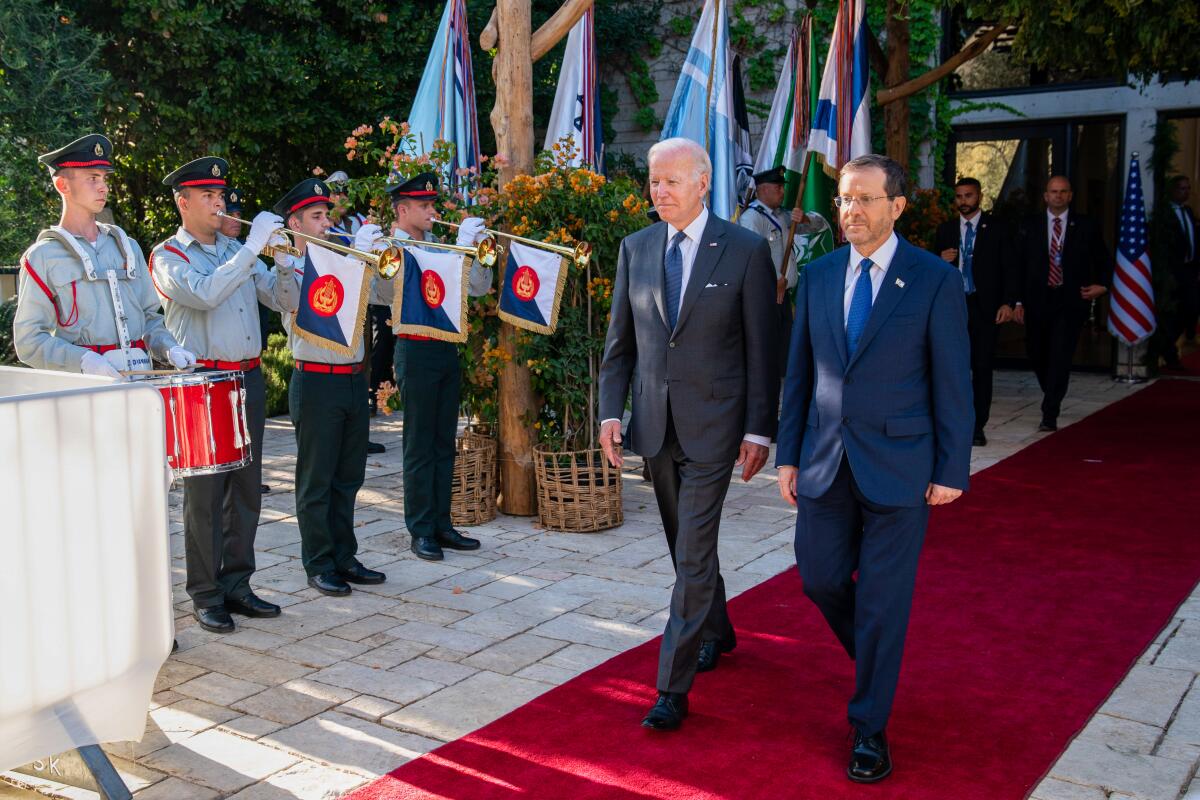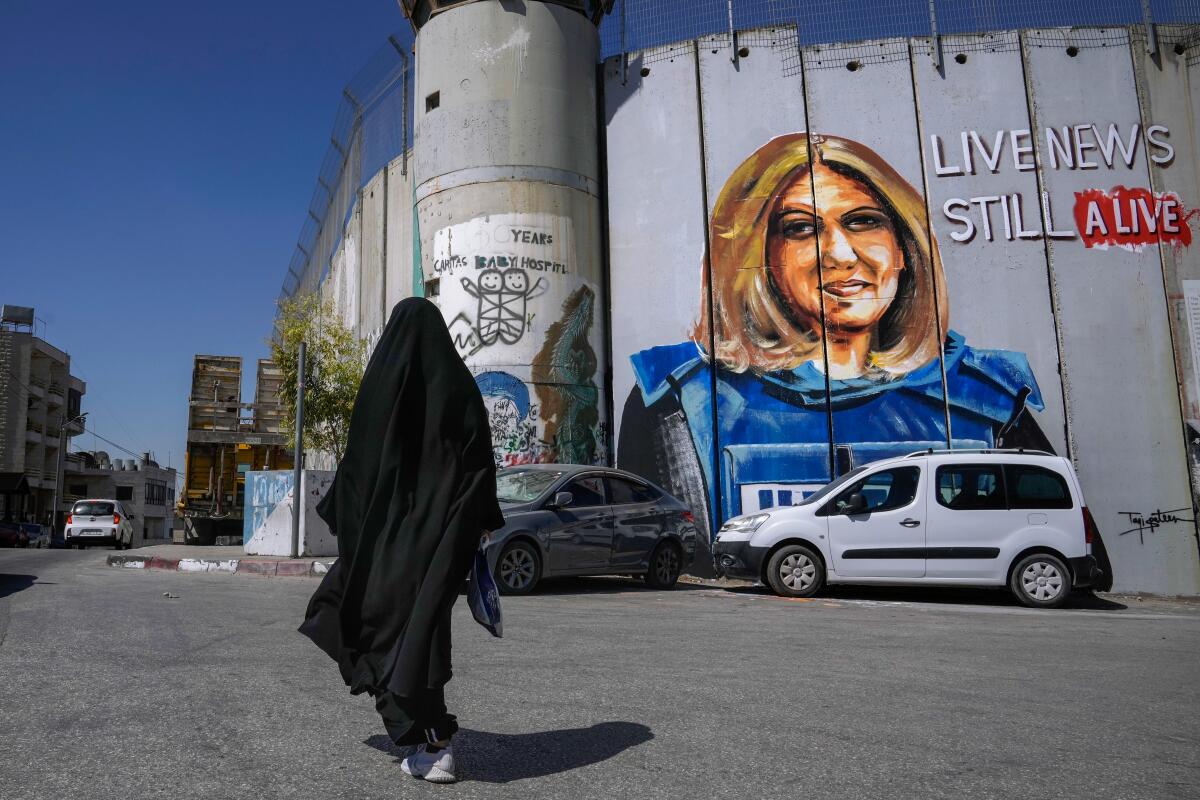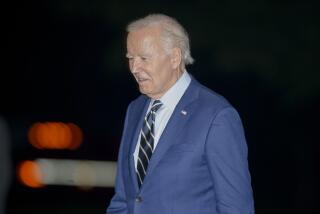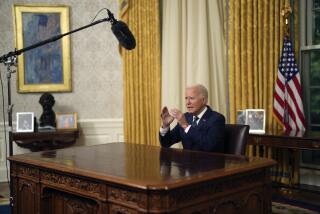News Analysis: Palestinians feel increasingly disillusioned by Biden’s approach

- Share via
JERUSALEM — The short ride that takes President Biden from Jerusalem to Bethlehem passes an enormous mural of a smiling woman, wearing a flak jacket, yellow paint giving highlights to her chestnut hair.
The painting depicts the Palestinian American journalist Shireen Abu Akleh, shot to death in May, probably by Israeli forces. The Biden administration’s reaction — a muted condemnation, an inconclusive investigation — is the latest in a long list of grievances Palestinians have with the current U.S. government.
For decades, Middle East diplomacy has usually revolved around the Palestinian demand for statehood and how to obtain it.
Yet, in Biden’s four-day trip this week to Israel, the occupied West Bank and Saudi Arabia, his only meeting with a Palestinian government leader is seen as little more than a courtesy call. And making peace between the Israelis and the Palestinians isn’t on Biden’s to-do list. Instead, the trip is focusing on Iran and regional security.
Upon arriving here on Wednesday, Biden said he continued to support the two-state solution — the concept of an independent Palestinian country sitting alongside Israel. But, the president conceded, such a historic step won’t happen “in the near term.”
In a later news conference, Biden repeated his long-held position that “Israel must remain an independent, democratic Jewish state.”
“I believe that to my core, and the best way to achieve that remains a two-state solution,” he said.
But he also said he has not reversed the Trump-era declaration that Jerusalem is the capital of Israel, a controversial position because Palestinians claim part of the contested holy city as their capital for an eventual state.
Given the political situations in Israel and the Palestinian leadership, administration officials have said there is no space for renewing negotiations. Israel is about to hold its fifth national election in four years, with a caretaker government in place.

On the Palestinian side, President Mahmoud Abbas has stayed in office a decade past the legal end of his term, and he has refused to hold new elections. Further complicating matters: Palestinian leadership is divided between the Fatah-dominated Palestinian Authority in the West Bank and the more militant Hamas, which controls the Gaza Strip.
The Palestinian issue was drastically marginalized by former President Trump. In addition to moving the U.S. Embassy here from Tel Aviv. Trump cut most aid to the Palestinians and closed their de facto embassy in Washington. He also shut down the U.S. Consulate in Jerusalem that served Palestinians
Trump’s policies were lopsidedly pro-Israel. Biden campaigned on reversing most of them and reviving the peace process, and his rhetoric raised expectations among the Palestinians.
But 18 months into his presidency, Biden has not fulfilled key promises, and Palestinians have grown deeply disillusioned with his administration.
“Biden’s approach to the Palestinians was already quite minimalistic coming in, focusing on reversing the most damaging changes implemented under Donald Trump while expending the least political capital,” Khaled Elgindy, a senior fellow at the Middle East Institute in Washington, said in a recent forum. “And yet, the administration’s policies have fallen well short of this already modest goal.”
Biden administration officials insist they had a lot to rebuild after Trump. The U.S. government has renewed aid to the Palestinians, they said, and has reopened diplomatic contact.
But that’s about it.
More important, say Palestinian activists, is that the Biden administration has turned a blind eye to rapid Israeli settlement in the West Bank and the demolition of Palestinian homes. Settlements, which much of the international community consider illegal under the Geneva Convention, have turned the West Bank into a Swiss-cheese landscape that will make it impossible for Palestinians to have a contiguous viable state in the territory, Palestinians say.
Already bitter, Palestinians were enraged when Abu Akleh, the journalist, was shot dead during an Israeli raid on the Palestinian town and refugee camp of Jenin on May 11. Though she was wearing a flak jacket that said “PRESS” and a helmet, she was nevertheless fatally struck by a bullet. Palestinians quickly blamed Israel; Israel said it was likely the work of a Palestinian gunman.
The State Department lamented the “terrible tragedy” but went no further.

In June, the United Nations human rights commission concluded Abu Akleh was shot by the Israelis, adding that “several single, seemingly well-aimed bullets were fired towards” her and a group of six other journalists “from the direction of the Israeli Security Forces.”
On July 4, the State Department said it was “likely” the deadly shot was fired by Israeli forces but there was “no evidence” that it was an intentional killing. It was unclear how the U.S.-appointed investigators reached that second conclusion because they did not interview members of the Israeli military. Israel eventually acknowledged its soldiers may have killed the journalist “accidentally.”
(Palestinians initially refused to hand over the bullet recovered from Abu Akleh’s body but eventually gave it to U.S. authorities to perform forensic testing. The U.S. concluded the bullet was too badly mangled to determine who fired it.)
Abu Akleh, whose funeral at a Greek Catholic church was disrupted by Israeli forces who said mourners were throwing rocks at them, was a veteran reporter for the Al Jazeera television network and something of a journalistic icon in Palestinian households. She was also a U.S. citizen.
Her family is demanding justice and a meeting with Biden. Secretary of State Antony J. Blinken, who is accompanying Biden, telephoned the family this week and invited them to Washington.
In a letter to Biden, the family accused the State Department of a “whitewash” in issuing its conclusions and said the U.S. “has been skulking toward the erasure of any wrongdoing by Israeli forces.”
Palestinian activists say the killing and how the investigation was handled have added fuel to restive anger fed by neglect and hostility that dominates the occupied territories. The difficulties are exacerbated by increasingly repressive Palestinian Authority security forces clamping down on dissent.
Diana Buttu, a lawyer and former advisor to the Palestinian Authority, said Palestinians were initially hopeful that when Biden took office things might change. Instead, they believe he has fallen “into lockstep” with policies that Trump had pursued.
“Not in tone but in practice,” she said in a video call from Haifa. “Trump laid down the foundation, and Biden is letting it go unchecked.”
The accords that are opening ties between Israel and several Arab countries that never recognized its existence — brokered first by Trump and being expanded by Biden — have further disheartened the Palestinians who believed Arab nations would only normalize relations with Israel once statehood had been resolved.
The Biden administration argues that broad normalization will make for a more secure region that ultimately benefits the Palestinians, too. Most Palestinians do not regard it that way, having watched as their most important bargaining chip evaporated.
Bierman reported from Jerusalem, Wilkinson from Washington.
More to Read
Get the L.A. Times Politics newsletter
Deeply reported insights into legislation, politics and policy from Sacramento, Washington and beyond. In your inbox twice per week.
You may occasionally receive promotional content from the Los Angeles Times.












